I have the great fortune of serving on the board of the Boston Area Rape Crisis Center (BARCC) here in my current hometown of Boston. This year, like every year, I’m raising money to support the organization, and am writing to inspire you to join me in making a gift.
BARCC is one of over 400 rape crisis centers across the country providing free and confidential services to survivors of sexual violence. BARCC’s expertise in survivor experience is unparalleled. Each year, BARCC serves over 10,000 survivors, their friends, and family members through hotline support, medical and legal advocacy, community outreach, and case management.
Every community needs a BARCC. And every BARCC needs loyal and generous supporters and donors. Three years ago, I had the honor of speaking to over 500 donors and volunteers at BARCC’s annual Champions for Change Gala and reflected on how my journey as a survivor might have been different had there been a BARCC in Maplewood, New Jersey.
Stories of sexual assault and abuse are incredibly messy and complicated. I want to tell you what happened to me, it’s impact on my life, and how my relationship with the Boston Area Rape Crisis Center is an important part of me feeling whole and healthy.
I will tell you in advance that my story has a happy ending, so you don’t have to be afraid to really listen.
If I tell my story in chronological order, it doesn’t make any sense, but here it goes: I was molested by my grandparents at a very young age (I was still in diapers), but I didn’t remember those experiences until I was 15 and away at a summer retreat. When I was 11, I was molested again by the same grandparents and finally told my mom. After I recovered memories of being abused as a young child, I started learning more about the family history and legacy of abuse. And then, when I was 17, a friend wouldn’t stop having sex when I wanted to stop. It wasn’t until I was in my twenties that I called it rape.
I can barely make sense of these experiences now, but as a teenager and young adult, I was completely overwhelmed and confused. In my family, at that time, we were supposed be a “happy family.” We were supposed to have holidays together, laugh, smile, and hang out. We were NOT supposed to talk about what was happening behind closed doors. We were NOT supposed to be hurt or angry about being abused. We were supposed to forgive and be a family again.
But I am a truth teller, and I was born that way. So denial, secrets, and shame made me feel completely crazy. I told. I was compelled to break silence. And I continue to tell the truth today.
The very first time I told anyone I was being abused, I was eleven years old. On a family vacation, I finally told my mom that my grandparents had molested me. My grandfather felt my breasts. My grandmother took a bath with me, during which she touched me sexually. At the time, my parents didn’t know how to respond. And they didn’t have anyone who could offer support or advice to our family. I wonder how things might have been different if she had called the BARCC hotline. She would have learned that our family wasn’t the only family to experience this trauma. She would have learned that her reactions of guilt, anger, and sadness were normal. And she would have learned how important it was for her to get me help right away.
Instead, she took the advice of an untrained therapist who told her that what happened to me wasn’t a big deal. She told my mom to leave it alone. She did, and I floundered.
By the time I graduated high school, I was alternating between starving myself and vomiting my meals. I had episodes of cutting. I hated my body. I couldn’t trust anyone. I lay awake at night and thought about dying. I wished that I had just been raped by a stranger in a dark alley so people could understand what happened to me – and that it was bad and horrible and traumatic. I felt broken. I was broken.
You have no idea how lucky you are sitting here tonight. Each and every one of you is lucky to live in a community where there is a BARCC.
I sometimes think about how my life might have been different had there been a BARCC in the community where I grew up, went to school, and first faced the reality of being sexually abused and assaulted. Maybe my pathway to healing and recovery would have been shorter. Maybe my friends and family members would have felt less helpless in the wake of what happened to me.
Had we lived here in Boston, things might have turned out different for me and for my family:
- My family would have had access to a 24-hour hotline for referrals, advice, and support. My parents could have attended a support group at BARCC, sought help for themselves, and found community with other survivors and families of survivors.
- The therapist they worked with might have participated in one of the many workshops and trainings BARCC offers to clinicians on how to respond and treat sexual trauma. She would have insisted that we all get help right away, and I might have avoided years of struggling and coping on my own through an eating disorder and other destructive behaviors.
- My teachers and guidance counselors might have been better equipped to recognize the signs of abuse or my response to it. They might have asked my parents or me about the signs I exhibited throughout elementary school, middle school, and high school. I was fearful and anxious. I wrote stories and poems about rape and violence. Maybe a teacher or guidance counselor would have followed up and insisted I get the help I so obviously needed.
- Maybe my college campus would have had resources to support my healing. As I came to terms with being sexually assaulted while away at college, I tried to find help on campus. There was a single support group for over 5,000 students – it met once a week for 12 weeks – and had 6 spots.
Despite the lack of services and awareness in my community, my story still has a happy ending. Thanks to over a decade of excellent individual and group therapy treatment, I was able to heal. But like most survivors, I needed long-term, professional treatment to stop hurting myself, start trusting people, and begin building a positive life for myself.
I know how lucky I am. I was only able to access these services because I came from a family who was able to pay for them out of pocket. My family was willing and able to invest thousands of dollars in my treatment and recovery.
Today, I lead a happy and productive life and make a positive social and economic impact on society. I have a great job, wonderful friends, and a loving, caring relationship. I pay taxes and I give back to the community in other ways - through service, through my career, and through supporting places like BARCC – as a volunteer, a donor, and a board member.
I started volunteering at BARCC as a way to give back and pay it forward to other survivors and to help educate communities about preventing sexual assault. I didn’t have a place like this when I needed it. But because of all of you who are here tonight supporting BARCC, that’s not the case for the women and men of Boston who have been or will be sexually assaulted. Because of you, BARCC can educate teachers, counselors, campuses and others on prevention and response to sexual assault.
BARCC provides these critical services to the community whether or not you provide financial support, whether or not you volunteer, whether or not you know BARCC even exists. One day, I hope we can live in a world free of sexual violence. Every day, I do something that gets us a little closer to that vision. Today, I stand here in support of BARCC, its amazing staff, its dedicated group of volunteers, and all of you.
I invite you to join me in supporting BARCC as a donor, a volunteer, and most importantly, as an agent for change. Until the day comes that all men, women, and children are safe, we need organizations like BARCC in our community and we need our communities to know that BARCC exists.
Please join me in supporting BARCC through the 2016 Walk for Change page or at www.barcc.org.

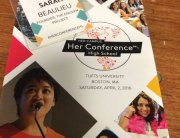
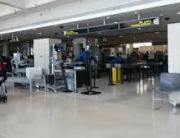
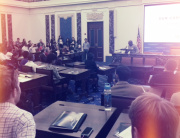
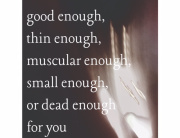

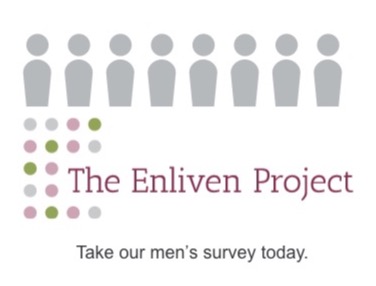
Leave A Comment